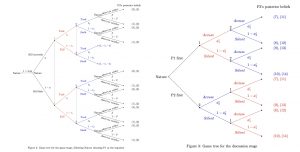The Ford project I worked on with Prof. Ho this summer studies Among Us, an online social deduction game that involves numerous strategic situations and exemplifies things like cooperation, betrayal, persuasion, and lying that are common in human interactions. We took advantage of game theory to analyze it theoretically and collect data from Let’s Play videos to gain a more empirical understanding.
The theoretical work started with a literature review on cheap talk models and lying, since we were attracted by the in-game chats during which players exchange (perhaps false) information. I then developed a simplified model featuring three stages, each corresponding to a part of the game, and connected by beliefs that are updated using Bayes’ Rule. Solving the model, I found several Markov perfect Bayesian equilibria that may describe how players interact in the game. This model will also provide foundations for adding players and strategies to the model to describe the original game in more detail.
On the empirical side of the project, I identified a preliminary list of 200 Let’s Play videos from YouTube and created a template spreadsheet to organize the information we would like to collect from the videos (chat transcripts, voting results, etc.). There is no good way of automating data collection as these videos vary in length and content, so we recruited workers from Amazon Mechanical Turk and volunteers from Reddit and Discord to help with filling out the spreadsheet for each video.
It was an amazing experience applying game theory to a real-life game and analyzing people’s strategic interactions from a video game, and I’m very grateful for the guidance of Prof. Ho. As more data is collected, we hope to find more about how people accuse/lie in the game and how other people respond to those behaviors.


